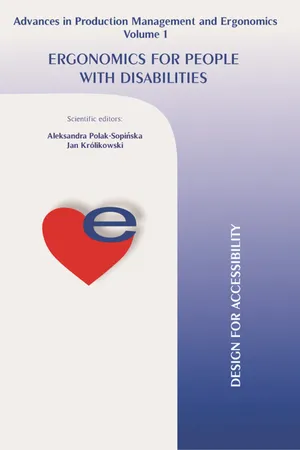
Ergonomics For People With Disabilities
Design For Accessibility
- 238 pages
- English
- PDF
- Available on iOS & Android
Ergonomics For People With Disabilities
Design For Accessibility
About This Book
The world of developed economies looks at the problems of people with disabilities from a technical, social, psychological and informational perspective. Impacts in favour of people with disabilities are most often equated with the removal of barriers and integration. Nowadays, virtually every form of social and economic life should take in account inclusion and removal of barriers. Urban planning, the design of buildings, communication networks and the products, tools can be done from the perspective of removing barriers for people with disabilities. It is crucial to promote a way of thinking aimed at taking into account the needs of people with disabilities in the creation of all new civilizational solutions.
Monograph "Ergonomics for People with Disabilities: Design for Accessibility" presents interdisciplinary attitude to the issue of designing for people with disabilities. The aim of the monograph is to present the factors affecting life activation of people with disabilities (including "50+" and "mature" people) and the problems that people with disabilities face by the participation in social and professional life and the daily activities and how design for accessibility can help with solving those problems.
Concepts presented in the first part are focused on designing of products supporting inclusion such as wheelchairs, orthopaedic seats, carrier vests and hand tools. This part consist of five chapters.
Field of interest of second part of the monograph is how to design accessible socio-technical environment. The subject is presented in four chapters on two hospital case studies, backyard sensorimotor path case and integrated therapeutic environment case.
Third part is focused on universal design with ICT solutions. It consist of the concepts and analysis of solutions supporting people with disabilities and elderly people presented in six chapters.
Scope of the last part is human factor design for barriers reduction. In three chapters problems such deafness, dementia and professional activity of people with disabilities were presented.
Monograph includes the wide perspective of engineers, designers, architects, psychologists, sociologists, vocational counsellors and medicals that can inspire to new look at design for accessibility.
Book Title: Ergonomics For People With Disabilities
Book Subtitle: Design For Accessibility
Scientific editors: Aleksandra Polak-Sopinska, Jan Królikowski
Technical editor: Magdalena Wróbel-Lachowska
Editors affiliations: Faculty of Management and Production Engineering, Lodz University of Technology, Poland
Series Title: Advences in Production Management and Ergonomics
Series ISSN: 2544-7610
Series Volume: 1e-ISBN: 978-3-11-061783-2
Edition Number: 1
Copyright: 2018
Publisher: De Gruyter
Copyright Holder: Department of Production Management and Logistics, Faculty of Management and Production Engineering, Lodz University of Technology, Poland
Number of Pages: 238
Department of Production Management and Logistics, Lodz University of Technology, Poland
ABSTRACTING & INDEXING
Ergonomics For People With Disabilities is covered by the following services:
Baidu Scholar
Bayerische Staatsbibliothek
BoD
Bowker Book Data
Ciando
CNKI Scholar (China National Knowledge Infrastructure)
Dimensions
DOAB (Directory of Open Access Books)
EBSCO
Elsevier – Scopus Books
ExLibris
Google Books
Google Scholar
Naviga
ReadCube
Semantic Scholar
TDOne (TDNet)
WorldCat (OCLC)
X-MOL
Frequently asked questions
Information
Table of contents
- Contents
- Introduction to the Monograph
- Designing of Products Supporting Inclusion
- Comparison of Two Different Carrier Vests for Shoulder-Supported Carrying of Loads
- Analysis of Use and the Search for Design Form and Construction of Orthopaedic Seats and Wheelchairs Intended for Children and Teenagers
- Preliminary Questionnaire Survey of a Wheelchair Prototype Driven by a Lever Mechanism
- Blumil – Smart Electric Wheelchair that Overcomes Obstacles
- Designing Handles of Hand Tools in the Aspect of Comfort and Safety
- Designing Accessible Socio-Technical Environment
- Evaluation of the Hospitalisation Conditions in Hospital Wards in Lodz from the Patient’s Perspective
- Contemporary Trends in the Design of Hospital Wards in the Context of Ergonomic Issues
- Backyard Sensorimotor Path. A New Form of Rehabilitation
- Ergonomic and Functional Analysis of the Integrated Therapeutic Environment, Guidelines and Improvement Concepts
- Universal Design with ICT Solutions
- Ergonomic Analysis and the Tracking Systems
- A Prototype System for Quantitative Assessment of Voice Fatigue
- Concept of the Application Supporting Visually Impaired People in Public Transport
- Identification of the Perceptive and Motor Skills in Elderly People when Designing a Human-Computer Interaction
- The Simulation of Corporal Experiences as a Strategy for the Elderly Inclusion in the Design Process
- The Concept of the Fund for the Development of Smart Cities (FDSC)
- Human Factor Design for Barriers Reduction
- Language Mediation as an Area of Risk for a Deaf Person
- Evidence Based Dementia Personas: Human Factors Design for People Living with Dementia
- The Importance of Work for People with Disabilities and Evaluation Imposed Obligations of Employers